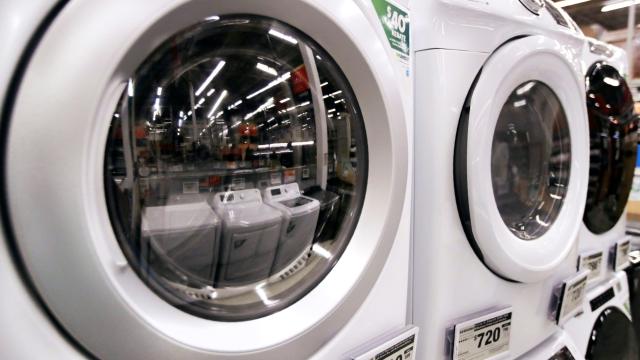In what might be a first, doctors in Germany think that a too-gentle washing machine helped spread a superbug to more than a dozen newborns and children in the same hospital — though thankfully, no one was hurt.
Antibiotic resistance has become a major public health threat over the years, and none more so than in hospitals.
The constant presence of antibiotics, sick patients with weaker immune systems and regular bodily contact between people make hospitals an ideal breeding ground for resistance. To combat and track the problem, many hospitals across the world now routinely test patients and hospital surfaces for known troublesome superbugs.
That’s the background behind a new case report published this week in the Journal of Applied and Environmental Microbiology.
According to the paper, a routine sweep at a children’s hospital in Western Germany in 2012 found that newborns in a neonatal intensive care unit were starting to carry a unique strain of resistant bacteria called Klebsiella oxytoca. The same germ was also later found in a child housed in a nearby paediatric ward.
Versions of K. oxytoca live harmfully in our gut, but it can also cause serious, life-threatening infections, particularly in hospitals.
Between April 2012 to May 2013, 14 children were found colonised with the same superbug. But luckily, the bacteria didn’t cause any sickness. Still, given the potential for grave harm, doctors began testing their staff and every corner of the hospital they could to unearth its source.
The only clear link they ended up finding was a washing machine on the same floor as the intensive care unit. Levels of K. oxytoca in the surfaces of the machine and the water it used was higher than anywhere else. But more crucially, the germ was also found in the knitted caps and socks regularly used to warm up newborns in these units.
[referenced url=”https://gizmodo.com.au/2019/01/bad-plumbing-helped-cause-a-strange-outbreak-of-antibiotic-resistant-bacteria-at-a-maryland-hospital/” thumb=”https://i.kinja-img.com/gawker-media/image/upload/t_ku-large/qejb1tmfxgp73dx5ax8p.jpg” title=”Bad Plumbing Helped Cause A Strange Outbreak Of Antibiotic-Resistant Bacteria At A Maryland Hospital” excerpt=”In 2016, a mysterious illness spread inside the National Institutes of Health’s Clinical Center, the U.S. government’s most prominent research hospital, in Bethesda, Maryland. Patients were somehow being sickened by an antibiotic-resistant strain of bacteria that practically never causes disease in humans. Two years later, a new study seems to finally have confirmed where this bug likely came from: the hospital’s own plumbing.”]
Historically, washing machines that wash our clothes at high enough temperatures to kill off most any germ have been used in homes, laundromats and especially hospitals. But more energy-efficient machines have started lowering the temperature of the water, or using less heat during certain cycles.
Near as the authors can tell, the clothes were contaminated by water left behind on the machine after washing and/or by the final rinse cycle, “which ran unheated and detergent-free water through the detergent compartment”.
After their discovery, the hospital switched out the washing machine (along with two water sinks that also contained traces of the superbug). And subsequently, no further children were found colonised.
But if their hunch was right, then it could have serious implications for hospitals and other hotbeds of antibiotic resistance that have their own in-house washing machines, such as nursing homes.
“If elderly people requiring nursing care with open wounds or bladder catheters, or younger people with suppurating injuries or infections live in the household, laundry should be washed at higher temperatures, or with efficient disinfectants, to avoid transmission of dangerous pathogens,” said senior study author Martin Exner, chairman and director of the Institute for Hygiene and Public Health at the University of Bonn, in a statement released by the American Society For Microbiology.
“This is a growing challenge for hygienists, as the number of people receiving nursing care from family members is constantly increasing.”
